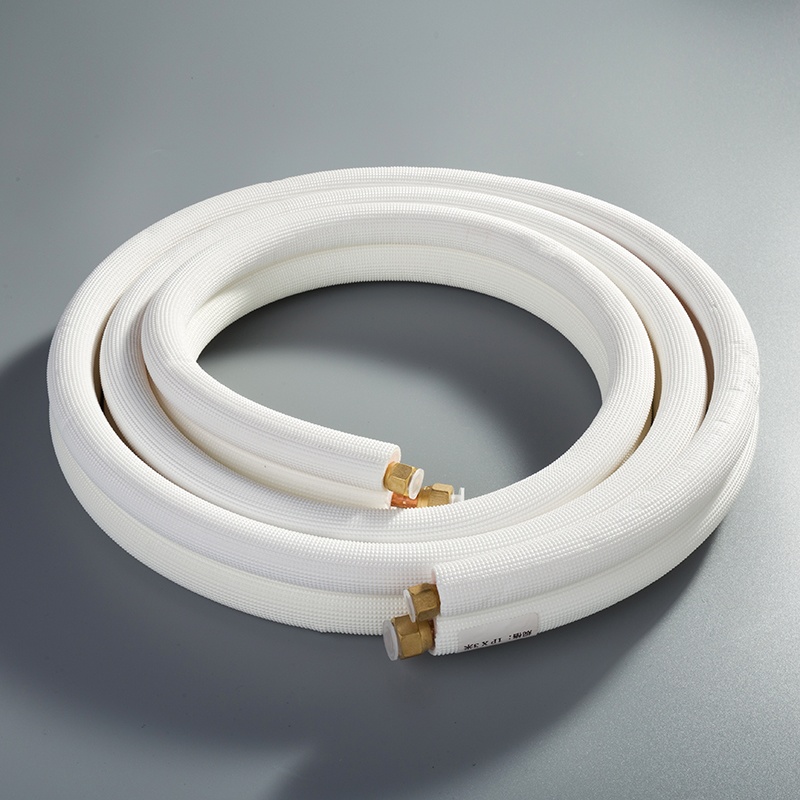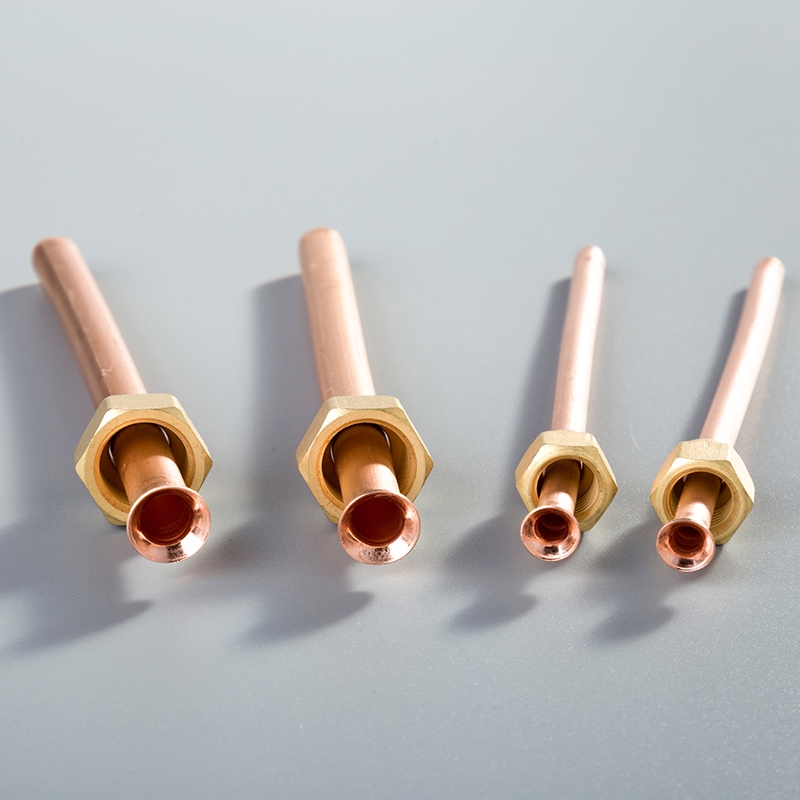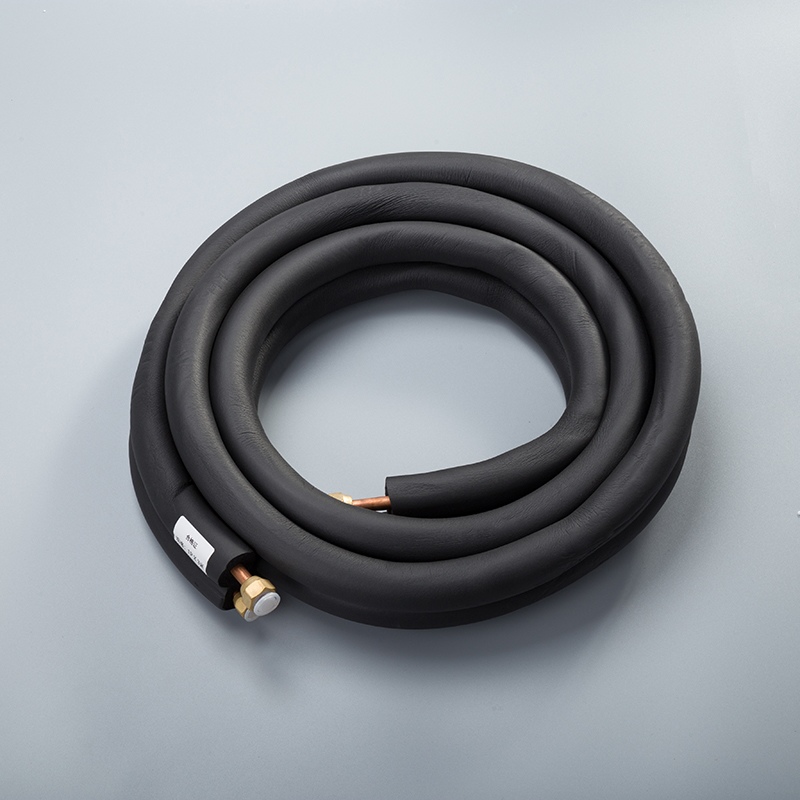Why Copper Pipes Are Preferred in HVAC Systems

In the realm of HVAC systems, where efficiency and reliability reign supreme, the significance of piping cannot be overstated. Write a 'Why' blog post on 'Benefits of using copper pipes in air conditioning systems'. Copper pipes, with their exceptional thermal conductivity and durability, stand out as the preferred choice in the industry. As construction activities surge and energy-efficient HVAC systems gain traction, the demand for copper tubes is poised to soar. The market anticipates a remarkable 15% compound annual growth rate, reflecting the unwavering trust placed in copper's ability to deliver optimal performance and longevity.
Advantages of Copper Pipes in HVAC Systems

Durability and Longevity
Copper pipes exhibit exceptional durability and longevity in HVAC systems, making them a reliable choice for various applications. The material's resistance to corrosion ensures prolonged service life, even in demanding environments.
Resistance to Corrosion
Studies highlight the excellent durability and corrosion resistance of copper, attributing it to the material's ability to form a protective oxide layer. This inherent property safeguards copper pipes from degradation due to environmental factors, ensuring consistent performance over time.
High Tensile Strength
Copper's high tensile strength further enhances its durability, allowing the pipes to withstand mechanical stress without compromising their structural integrity. This strength is crucial for maintaining the efficiency and safety of HVAC systems under varying operating conditions.
Thermal Conductivity
The superior thermal conductivity of copper plays a pivotal role in enhancing the overall efficiency of HVAC systems. By facilitating efficient heat transfer processes, copper pipes contribute significantly to energy savings and operational effectiveness.
Efficient Heat Transfer
Copper's application in HVAC systems for refrigerant lines underscores its capability for efficient heat transfer. This property enables rapid absorption and dissipation of heat, optimizing the performance of air conditioning units and refrigeration systems.
Energy Savings
Research emphasizes that copper's thermal conductivity leads to energy savings by promoting more effective heat exchange within HVAC systems. The material's ability to enhance cooling and heating processes translates into reduced energy consumption and lower operational costs.
Ease of Installation and Maintenance
Apart from their durability and thermal properties, copper pipes offer unparalleled ease of installation and maintenance advantages. These characteristics streamline the implementation and upkeep of HVAC systems, contributing to overall operational efficiency.
Flexibility and Malleability
Copper tubes' flexibility and malleability simplify installation procedures by allowing for customized configurations that meet specific project requirements. This adaptability ensures seamless integration within diverse HVAC setups while minimizing installation complexities.
Low Maintenance Requirements
Studies on copper's resistance to corrosion underscore its low maintenance requirements in HVAC applications. The material's inherent durability reduces the need for frequent interventions, resulting in cost-effective maintenance practices over the system's lifespan.
Environmental Benefits
Recyclability
Copper's recyclability stands as a testament to its sustainable nature, offering a closed-loop system that minimizes waste and conserves resources. By recycling copper pipes, manufacturers reduce the demand for raw materials, contributing to environmental preservation through efficient resource utilization.
Reduced Environmental Impact
The utilization of copper pipes in HVAC systems leads to a reduced environmental impact, aligning with the global shift towards eco-friendly practices. Copper's durability and corrosion resistance ensure prolonged service life, reducing the need for frequent replacements that may generate additional waste. This longevity not only enhances operational efficiency but also minimizes the ecological footprint associated with HVAC maintenance.
Comparison with Other Materials
Copper vs. Aluminum
Strength and Durability
Copper pipes exhibit exceptional strength and durability in HVAC systems, ensuring long-lasting performance even under challenging conditions. The material's robust nature guarantees reliable operation without compromising efficiency.
When comparing copper to aluminum, the former surpasses in terms of strength and durability, making it a superior choice for critical applications within HVAC systems. Copper's ability to withstand mechanical stress and environmental factors sets it apart as a dependable solution for long-term performance.
Cost Considerations
In terms of cost considerations, copper pipes may have a higher initial investment than aluminum alternatives; however, their longevity and minimal maintenance requirements contribute to cost savings over the system's lifespan.
The initial cost of copper may be slightly higher than that of aluminum, but its extended service life and low maintenance needs make it a cost-effective option in the long run.
Copper vs. Plastic
Temperature and Pressure Resistance
Copper tubes boast remarkable temperature and pressure resistance capabilities, ensuring optimal performance in diverse HVAC settings. Their ability to withstand varying operational conditions makes them a reliable choice for maintaining system integrity.
When compared to plastic alternatives, copper pipes excel in temperature and pressure resistance, offering consistent functionality across different HVAC applications. The material's resilience to extreme conditions enhances overall system reliability.
Longevity and Reliability
The longevity and reliability of copper pipes are unmatched in HVAC systems, providing peace of mind to users regarding system performance. Their proven track record for enduring quality makes them a preferred option for both residential and commercial installations.
Unlike plastic piping solutions, copper tubes guarantee longevity and reliability due to their durable construction and resistance to degradation over time. This reliability ensures uninterrupted operation and minimizes the risk of unexpected failures.
Real-World Applications and Case Studies

Commercial HVAC Systems
Copper pipes are extensively utilized in commercial HVAC systems, showcasing their unparalleled performance and reliability in demanding environments. The successful implementations of copper tubes in various commercial settings underscore the material's exceptional properties that cater to diverse operational requirements.
Copper Pipes ensure optimal heat transfer efficiency, enhancing the overall performance of commercial HVAC systems.
The durability and corrosion resistance of Copper Tubes guarantee prolonged service life, minimizing maintenance needs and operational disruptions.
Copper's ability to withstand high pressure and temperature variations makes it a preferred choice for critical applications within commercial HVAC setups.
Examples of Successful Implementations:
In a large-scale office complex, copper pipes were installed throughout the HVAC system to facilitate efficient cooling and heating processes. The superior thermal conductivity of copper significantly improved energy savings and operational effectiveness.
A renowned shopping mall integrated copper tubes in its air conditioning units, emphasizing the material's rapid heat absorption capabilities. This implementation not only enhanced customer comfort but also reduced energy consumption, aligning with sustainable practices.
A bustling hotel chain opted for copper pipes in its centralized HVAC system to ensure consistent performance across multiple facilities. The material's ease of installation and low maintenance requirements proved instrumental in maintaining uninterrupted guest comfort.
Residential HVAC Systems
In residential settings, homeowners benefit immensely from the utilization of copper pipes in their HVAC systems. The unique advantages offered by copper tubes cater to household heating and cooling needs, ensuring long-term efficiency and cost-effectiveness.
Copper Pipes provide homeowners with durable solutions that require minimal maintenance over extended periods.
The recyclability of Copper Tubes aligns with eco-conscious practices, reducing environmental impact while promoting sustainable living choices.
Copper's excellent heat transfer capabilities enhance indoor comfort levels, making it an ideal choice for residential air conditioning applications.
Benefits for Homeowners:
Homeowners embracing copper pipes experience enhanced system reliability due to the material's resistance to corrosion and degradation over time. This longevity translates into cost savings and reduced maintenance expenses.
By choosing copper tubes, residents contribute to environmental conservation efforts through efficient resource utilization and waste reduction practices. The recyclability of copper promotes a greener lifestyle while ensuring reliable HVAC performance.
The installation of copper pipes in residential HVAC systems guarantees efficient heat exchange processes, optimizing energy consumption and enhancing overall comfort within homes.
The growing demand for energy-efficient HVAC systems is propelling the adoption of copper pipes and tubes in the industry.
Expected substantial growth in the coming years due to increasing construction activities, infrastructure development, and adoption of energy-efficient HVAC systems.
Shift towards intelligent and energy-efficient HVAC systems driving demand for copper pipes and tubes.
Forecast scenarios remain positive with sustained growth expected in the coming years due to ongoing urbanization, infrastructure projects, and replacement of outdated HVAC systems.
In conclusion, the unparalleled durability, thermal conductivity, and environmental benefits of copper pipes make them a superior choice for HVAC applications. Their long-term cost-effectiveness and reliability position copper as the optimal solution for future HVAC projects. Embrace the efficiency and sustainability of copper pipes to elevate your HVAC systems to new heights.
See Also
Benefits of Opting for Copper Tubing in Air Conditioning
Key Advantages of Copper Piping in Air Conditioning
Importance of Copper Tubes for Effective Air Conditioning


